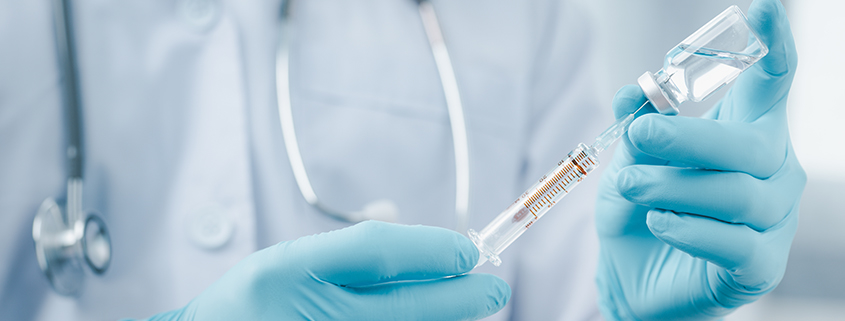HPV Vaccination: Help against various Types of Cancer
The World Health Organization (WHO) sees an increasing HPV vaccination worldwide as a great opportunity in the fight against various types of cancer. At the organization’s annual meeting, WHO director Tedros Adhanom Ghebreyesus declared that he wanted to use the HPV vaccine more widely. The aim is to act against the globally increasing cases of cervical cancer. With additional treatments and new tests, five million deaths could be avoided by 2050 and many lives could be saved, said Ghebreyesus[1].
What is the strategy of WHO? In the following, we will take a closer look at the dangers coming from a human papillomavirus infection (HPV). We will also discuss the opportunities that vaccination offers against HPV.
What happens with an HPV infection?
HPV infection is primarily a sexually transmitted infection. In fact, most sexually active people become infected with the virus at least once in their lives[2]. However, most HPV infections have no apparent symptoms. They heal on their own. They can no longer be detected after just one or two years.
Regardless of the inconspicuous course, a distinction is made between low-risk HPV types and high-risk HPV types. The former is, for instance, responsible for HPV genital warts that require medical treatment. If an infection with high-risk HPV does not heal by itself, it can develop into cancer through various preliminary stages. This lasts on average 10 to 15 years[3].
According to the Center for Cancer Registry Data, around 6,250 women and 1,600 men develop HPV-related cancers in Germany every year[4].
Types of cancer caused by HPV include:
- Cervical cancer
- Carcinomas in the genital area: vagina, vulva, penis and in the anus
- Head-and-Neck tumors in the area of the throat, tonsils and the base of the tongue
What diseases does HPV vaccination protect against?
Vaccines against the main high-risk types of HPV have been around for several years[5]. The human papillomavirus vaccine has been used in Europe and the USA since 2006. In 2020, a first study from Sweden demonstrated the success of vaccinating against cervical cancer. According to the study results, women who were vaccinated against HPV up to the age of 17 had an 88 percent lower risk of cervical cancer than unvaccinated women[6].
Furthermore, the vaccine is used as a preventive measure for Head-and-Neck malignancies. Anna-Bawany Hums works as a molecular biologist in the research and development department of oncgnostics GmbH: “Head-and-Neck tumors that are traced back to papillomavirus develop over even longer periods of time than cervical cancer. Therefore, there are no current studies that show the effects of HPV vaccinations on these cancers[6]. This makes it all the more important to improve the diagnosis for this disease at the same time. We at oncgnostics are researching how to detect Head-and-Neck tumors in their early stages using non-invasive diagnostic methods. In this way we want to increase the chance of a therapeutic success. The earlier cancer is detected, the better the prospects of a cure are for those who are affected”.
Who should be vaccinated?
The German Standing Committee on Vaccination (STIKO) states that the most effective HPV vaccine age, both for boys and girls, should be between 9 and 14. Child vaccinations should be executed due to several reasons:
- Protection against individual HPV types can no longer be established if there is a permanent infection or even a precancerous stage. The HPV vaccination is therefore ideally carried out before the first sexual contact is made. Missed vaccinations should be made up as soon as possible. This can be done up to the age of 17 years.
- Studies show that younger girls have a better immune response to the HPV vaccine than older girls. Correspondingly, vaccination for kids only requires two doses of vaccine.
Whether you are vaccinated or not: HPV Prevention is central
HPV-induced cancers develop over many years and precursors. Even after the HPV vaccination, a residual risk remains. Regular preventive examinations are therefore of crucial importance. In Germany, for instance, a new program for early detection of cervical cancer has been in place since 2020. The program includes co-testings with Pap smear and HPV test for women aged 35 and over.
At its annual meeting, the WHO urged the 194 member countries that at least 70 percent of women should be tested for cervical cancer by the age of 35. In addition, by 2030 at least 90 percent of girls should be fully vaccinated against HPV before they turn 15 years old.
There are still no standardized rules worldwide on systematic preventive examinations for Head-and-Neck tumors. Therefore, it is important to consult a doctor soon in order to clarify complaints in the mouth and throat area at an early stage.
————————————————————
[1] WHO stellt Strategie zur Bekämpfung von Gebärmutterhalskrebs vor. In: Ärzteblatt, 17. November 2020. Online: www.aerzteblatt.de/nachrichten/118411/WHO-stellt-Strategie-zur-Bekaempfung-von-Gebaermutterhalskrebs-vor
[2] Robert Koch Institut (2020): HPV (Humane Papillomviren): Antworten auf häufig gestellte Fragen (FAQ) zu Erreger und Impfung. Online: www.rki.de/SharedDocs/FAQ/Impfen/HPV/FAQ-Liste_HPV_Impfen.html;jsessionid=3F10B057E8CD109E0C8EF04167FB32E6.internet072?nn=2375548
[3] Bundesgesundheitsministerium (2020): Verbesserte Früherkennung von Gebärmutterhalskrebs seit Januar 2020. Online: www.bundesgesundheitsministerium.de/themen/praevention/frueherkennung-vorsorge/frueherkennung-von-gebaermutterhalskrebs.html
[4] Robert Koch Institut (2018): RKI-Ratgeber. Humane Papillomviren. Online: www.rki.de/DE/Content/Infekt/EpidBull/Merkblaetter/Ratgeber_HPV.html
[5] Krebsinformationsdienst: Humane Papillomviren und Krebs. Online: www.krebsinformationsdienst.de/vorbeugung/risiken/hpv.php
[6] Robert Koch Institut (2020): HPV (Humane Papillomviren): Antworten auf häufig gestellte Fragen (FAQ) zu Erreger und Impfung. Online: www.rki.de/SharedDocs/FAQ/Impfen/HPV/FAQ-Liste_HPV_Impfen.html;jsessionid=3F10B057E8CD109E0C8EF04167FB32E6.internet072?nn=2375548

 LookerStudio/www.shutterstock.com
LookerStudio/www.shutterstock.com